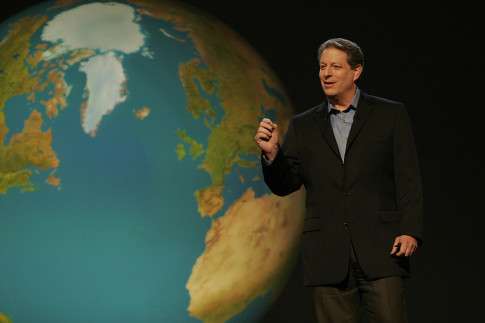Almost-President and former U.S. Vice President Al Gore has earned many forms of recognition, including a Grammy, an Emmy, and a Nobel Peace Prize. But has he earned a designation of a public intellectual? Breaking down the title literally, Gore’s Grammy and Emmy awards speak to his publicity, while the Nobel Peace Prize is certainly helpful in arguing for his intellect. Logistically, like 1 + 1 = 2, this would indicate Gore as an apparent qualifier. However, the nature of a public intellectual is more of an intricate art than a logical science, and the portrayal of Al Gore as one renders the definition, much like issues of global warming, ambiguous and inconclusive.
Beyond awards, Gore has some lofty credentials capable of classification as a public intellectual. He attended Harvard University and law school at Vanderbilt University. He was in political office as a member of the House of Representatives, a U.S. Senator, and the Vice President to President Bill Clinton. He is also an accomplished author; his most famous work An Inconvenient Truth: The Planetary Emergency of Global Warming and What We Can Do About It inspired the production of an award-winning documentary film. According to Foreign Policy Magazine, Gore is actually firmly within its final rankings of the Top 100 Public Intellectuals, surrounded by names like Noam Chomsky and Bernard Lewis. This inclusion isn’t all too surprising, as Gore does perform one important function of a public intellectual, as described by Stephen Mack in his essay, The “Decline” of Public Intellectuals?:
…the public intellectual function is criticism. And if intellectuals are in a better position to perform that function it’s not because they are uniquely blessed with wisdom—and it’s certainly not because they are uniquely equipped to wield social or political power. It is only because learning the processes of criticism and practicing them with some regularity are requisites for intellectual employment. It’s what we do at our day jobs.
Gore has not been shy about criticizing the Bush Administration since 2002, covering issues domestic and international, political and social.
However, Stephen Mack also writes:
…our notions of the public intellectual need to focus less on who or what a public intellectual is—and by extension, the qualifications for getting and keeping the title. Instead, we need to be more concerned with the work public intellectuals must do, irrespective of who happens to be doing it.
The focus and emphasis regarding public intellectuals, or those in question, should be placed on the work. While Gore’s criticisms may qualify him as a public intellectual, his more renowned work regarding the environment has been falsely recognized as the function of a public intellectual.
Many skeptics of Gore’s environmental concerns tote him as the inventor of global warming. Nonexistent issues before his studies and research, the environmental dangers that face our world are now an emergency after decades of global lectures and conferences led by Gore. The creation of a worldwide worry is the prominent reason why the portrayal of Gore as a public intellectual problematizes the notion. Granted, with extremely thorough research and study, a well-educated political figure with a voice could formulate the next global crisis and be lauded with the same praise. After the debut of the documentary film An Inconvenient Truth, there were a number of disbelievers, some with elaborate and thorough responses. Detailed lists of alleged fallacies were brought up, reactions suspicious of the overarching political stance of the work. Though Gore’s environmental endeavors have been successful in keeping the “pot boiling,” lesser individuals have also created a global stir with imaginative and phenomenal creations of their own. Despite consistently chipping away at the barrier between his own and public intellectual status, the illustrious title should be absent from Al Gore’s albeit tremendously impressive resume.
